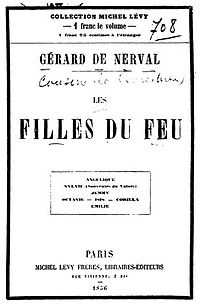Les Filles du feu
|
Title page from 1856 edition of Les Filles du Feu | |
| Author | Gérard de Nerval |
|---|---|
| Country | France |
| Language | French |
| Genre | Short story collection |
Publication date | 1854 |
| Media type | Print (Hardback & Paperback) |
| ISBN | NA |
Les Filles du Feu (English: Girls of the Fire) is a collection of short prose works and stories published by the French poet Gérard de Nerval during January 1854, a year before his death. During 1853, Nerval had suffered three nervous breakdowns and spent five months in an asylum, and he saw Les Filles du Feu as an opportunity to show the public, his friends, and his father that he was sane.[1]
However, all of the pieces in Les Filles du Feu had been published previously: "Angélique" in Les Faux Saulniers (1850), "Sylvie" in La Revue des Deux Mondes (1853), and "Emilie," "Jemmy," "Isis," and "Octavie" in multiple reviews.
Nerval had considered two other titles for the book, Les Amours Perdues and Les Amours Passées, which reflect the influence that it would have on Marcel Proust's Á La Recherche du Temps Perdu. Some of the stories feature two or three Filles du Feu.
À Alexandre Dumas
In his introduction and his dedication to Dumas, his friend and collaborator in some theatrical works, Nerval quotes from a piece by Dumas published the previous December in which Dumas had attributed Nerval's mental crises to an excess of creative imagination, and his propensity for acting out the lives of the great historic figures that he wrote about as being due to his identification with them. Nerval elaborates on this theme, remembering humorously the conviction with which their old friend and luminary Charles Nodier had told them that he had been guillotined during the revolution, and how Nodier had been so convincing that they had wondered how he was able to restore his head. Nerval examines the issue of writers (and actors) identifying with their subjects, and he hints at a forthcoming work describing his crises, in a reference to his novel Aurélia which was published after his death.
Angélique
Written in the form of twelve letters addressed to a journal, the story recounts the author's travels through France and Germany in search of an untraceable antique book and his discovery of the diary of an historic Fille du Feu. The longest story of the book.
Sylvie (Souvenirs du Valois)
Much admired by Marcel Proust for its poetic vision, Sylvie is a semi-autobiographical tale of a man who is haunted by the memory of three women in his life, all of whom seem to blend together. The story opens with the narrator at the theatre, where he is enamored an actress named Aurélie. He is suddenly reminded of a memory from childhood, and he experiences a flashback. First, he remembers a festival where he danced with a local girl named Sylvie but was entranced by Adrienne, a young noble (whose resemblance to Aurélie is what brings on the flashback). Adrienne ultimately becomes a nun.
As Adrienne is unobtainable, he returns to Sylvie several years later and spends many days with her. As they pass by a monastery, the narrator mentions Adrienne, much to Sylvie's dismay. He returns to Paris.
The narrator returns, and Sylvie and he spend a day socializing at an elderly relative's home. However, nothing results from this, and the narrator leaves again.
Finally, Sylvie marries someone else, and the narrator pursues Aurélie, the actress, more aggressively. They become friendly, and the narrator asks her if she ever spent time in a convent, associating her with Adrienne. Ultimately, Aurélie ends her relationship with the narrator, and the narrator returns one final time to Sylvie, now a mother. When he asks about Adrienne, Sylvie reveals that she has been dead many years.
Chansons et Legendes du Valois
A short essay that is appended to Sylvie wherever it is published, it does not constitute a separate section of Les Filles du Feu in itself. The essay describes some folk songs of the province of Valois where Nerval had grown up and where Sylvie is set, and it includes a short folk tale, La Reine des Poissons (The Queen of the Fishes).
Jemmy
A translation, reconstruction, and adaption of a story by Charles Sealsfield, pseudonym of Austrian author Karl Postl (1793-1864), this tale of Jemmy O'Dogherty's adventures among the native Americans is one of the highlights of the collection. Described by Nerval as "Imité de l'Allemand".
Octavie
An essay in the form of a reminiscence, the author has a yen to visit Italy, and on his way there he meets Octavie, an English girl, while swimming at Marseille. Octavie presents him with a fish. In Italy he meets her again, where she is accompanied by her infirm father. They arrange for a meeting, and in the meantime the author enjoys a pleasant evening with a noble and his charming sisters. The essay reproduces a letter written by the author to a young woman in France in which he expresses his desire to die for her. When Octavie and the author meet again they visit Pompéi and the temple of Isis. Octavie expresses the wish to play the rôle of Isis, and Nerval that of Osiris, introducing the theme of the next essay. Years later, the author learns that Octavie has married a young man who has become paralyzed and bedridden and is jealous of her, and the author laments her fate.
Isis (Souvenirs de Pompéi)
Written as a travel piece, this narrative relates the influence of Egypt’s religion in the Roman Empire, and Nerval describes a visit that he had made to Pompéi. The prevailing light in the essay is moonlight, and the Fille du Feu is the goddess Isis. The essay concludes with an examination of some themes common to Christianity and to older religions.
Corilla
A short play relating the adventures of two suitors who are after the favors of a theatrical actress. One of them is fobbed off with a flower seller by the official that he pays. The play ends amicably and is a light comedy. The Filles du Feu are the actress and the flower seller.
Emilie

Untypical of Nerval, who was a poet rather than a fiction writer, this story is understood to have been largely the work of a friend of Nerval and a fellow collaborator of Dumas named Auguste Maquet, who left a note in manuscript claiming that he had worked on it for Nerval according to a plan given to him. Maquet had disliked the ending but had produced what Nerval intended. First published in 1839 and signed "G." under the title Le Fort de Bitche in the journal Le Messageur, this is the earliest of the works in the collection.
Emilie is the story of Desroches, a French lieutenant serving near Bitche in Lorraine near the German border, defending it against the threat of Prussian attacks some time after 1815. He is wounded in the face, and while he is being healed in Metz, he meets and befriends Emilie, a young woman from Haguenau (Alsace), and her aunt. The two become enamored and decide to marry in her home town. The night before the civil ceremony, they stop at Bitche. Desroches tells some fellow soldiers about how he had "killed the first and only man I ever struck in hand-to-hand fighting" during a Prussian attempt on the fort of Bitche. The next day Desroches, his wife, and her brother Wilhelm leave. At an inn, Wilhelm argues with Desroches' acquaintances about his father's death by a French soldier at the same fort in Bitche. The soldiers are surprised at how similar Wilhelm's story is to Desroches'. The next day, Wilhelm asks Desroches to give him a tour of the fort, and when they get to the spot where Wilhelm's father was killed, Wilhelm accuses Desroches and challenges him to a duel. Emilie sends a priest to intervene, but Desroches realizes that he and his wife can never be happy, as he was her father's killer. Desroches re-enlists and is killed on the front line; Emilie retires to a convent.
Les Chimeres
A sequence of twelve famous sonnets that is appended to Les Filles du Feu. The poems are: El Desdichado, Myrtho, Horus, Antéros, Delfica, Artémis, Le Christ Aux Oliviers (I, II, II, IV, V), Vers Dorés.
External links
- Les Filles du feu in French at Gallica
Footnotes
- ↑ Bony, Jacques. Introduction. Les Filles du Feu by Gérard de Nerval. Paris: GF Flammarion, 1994.
